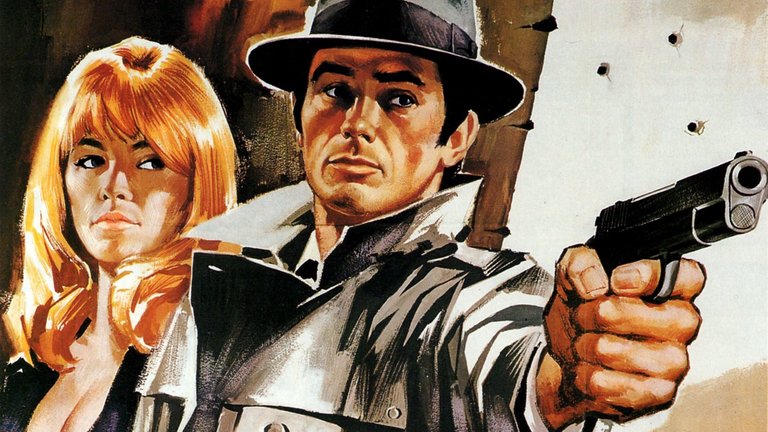
Recent flood of serial killer films from Hollywood might tell otherwise, but the most fascinating category of movie criminals could be found among professional assassins. This becomes evident when the said assassins are the movie protagonists. Filmmakers are often struggling to reconcile the morally objectionable nature of the said profession - taking of human lives in cold blood - and the almost mystical skills that allow them to remain professionals in the first place. So, it's not very surprising that many films end up mystifying and glamourising this immoral trade, turning the hit men as the incarnation of the "cool". For some, 1980s Hong Kong action films started the trend, but their inspiration came in the form of a film from another time and another place – Le Samouraï, 1967 ultra-stylish crime drama by great French director Jean-Pierre Melville.
The protagonist of the film is Jef Costello (played by Alain Delon), hit man who is hired to kill Parisian nightclub owner. Jef has never been caught, and this is due to his methodical approach to the job - the contracts are always arranged through intermediaries, the weapons and means of transportation are always disposable, the hits are well-planned while his girlfriend Jane Lagrange (played by Nathalie Delon, Alain Delon's wife at the time) and couple of underworld associates always provide nearly perfect alibis. The plan unfolds almost flawlessly, except in the moment when the lady pianist (played by Cathy Rosier) happens to spot Jef immediately after the murder. Jef is afterwards picked by the police among dozens of potential suspects and quickly becomes the focus of attention of the Police Superintendent (played by Fran㎜is P ier). The pianist, however, for some strange reason fails to recognise Jef and he gets released, only to become the target of the assassination attempt himself. Jef, realising that the people who ordered the hit are restless and want to silence him, wants to find them and the pianist seem to be the key to the mystery. In the meantime, he must evade police, determined to find any excuse to put him back to jail.
At first glance, Le Samouraï looks like a film that in many ways glamourises the profession of contract killer. Young and charismatic Alain Delon with his fedora and overcoat looks a predecessor of Chow Yun-Fat and other "cool" hit men we have seen in past few decades. But this impression is only superficial. All those who allow themselves to be drawn in the world of Le Samouraï would find that the film shows the other side of the coin. The nature of the profession, with the constant risk of capture by police or betrayal by criminal associates, leads to distrust and constant paranoia, and, in the end, the said individuals might look glamorous, but inside they are lonely, emotionally crippled and unhappy. All that can fill this emptiness is the job itself, and the missing emotional links to other humans are compensated with the perverted professional code, in some way similar to Bushido (which Melville deliberately misquotes in the opening scene of the film). This impression could be read through the face of Alain Delon who never smiles thought the whole course of the film, and whose stone face hardly displays any emotion at all. The cold, grey interior sets of his character's home, as well as rain and cloudy sky over Paris creates the atmosphere that enhances this effect.
Melville, stripped the story to the bone, in a same way he did it with the title character. The other characters, even those who are important to the story, are one-dimensional, but this actually suits the purposes of this ascetic film. There are few exceptions to this. One is the character of Police Superintendent (superbly played by François Périer), whose determination to bring Jef down leads him to occasional emotional outbursts, as well as use of blackmail. The other is character of Jane Lagrange, who allows herself some genuine feelings for Jef and, consequently, protects him against her better judgement. Although both of them hardly display strong emotions under Melville's minimalist style, those emotions are there, providing strong contrast with Jef and his cold, sad existence.
The direction of the film, however, isn't as perfect as this movie's almost legendary status would indicate. There are some memorable scenes - the hit, police line-up, Jef's cat and mouse game with police detectives in Parisian Metro, and the great finale – but Le Samouraï, while being a truly great film, is far from masterpiece. The main reason is in the pace, which is at times unbearably slow, even for those viewers accustomed to pre-MTV standards. There are some scenes that seem overlong (especially the one featuring two police detectives planting listening devices in Jef's apartment), and because of them Le Samouraï sometimes looks like a cure for insomnia. However, apart from those scenes, Le Samouraï, with great acting, superb settings, simple and effective story, remains one of the better examples of genre cinema and it should be recommended even to viewers who aren't interested in finding sources of John Woo's and Quentin Tarantino's inspiration.
RATING: 8/10 (+++)
(Note: The text in its original form was posted in Usenet newsgroup rec.arts.movies.reviews on August 20th 2001)
==
Blog in Croatian https://draxblog.com
Blog in English https://draxreview.wordpress.com/
Cent profile https://beta.cent.co/@drax
Minds profile https://www.minds.com/drax_rp_nc
Brave browser: https://brave.com/dra011
BTC donations: 1EWxiMiP6iiG9rger3NuUSd6HByaxQWafG
ETH donations: 0xB305F144323b99e6f8b1d66f5D7DE78B498C32A7
Movie URL: https://www.themoviedb.org/movie/5511-le-samoura?language=en-US
Critic: AAA
You have received a 3.69% upvote based on your stake of 2456.51505241 UFM! Votes today: 1